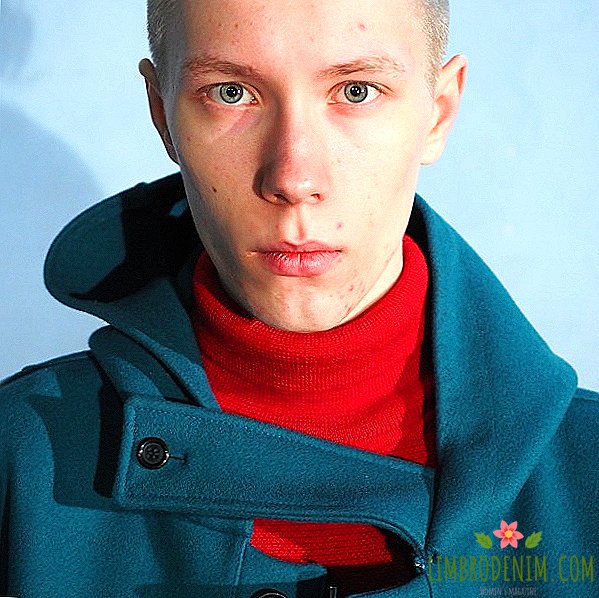How I fell in love with Barcelona and moved there to live
My love for Barcelona began with a story worthy of a Hollywood romcom. I flew to this city exactly on the day of my majority, all alone, and spent five days in it - without a special plan, without places to visit, with zero knowledge of Spanish. I walked the streets with my mouth open, admired the balconies and thought: "I want to live here!" An elderly Spaniard came up to me on the street, said something, I answered: “I don’t understand anything,” he kissed me on both cheeks and left. Then I was on the beach listening to an African story about how he was learning Spanish in the streets. I ate sandwiches with cheese and tomatoes - I later dreamed about them. I flew away with a new goal - to move to Barcelona.


When I was 20 years old, I started learning Spanish and after the first year of work I went on vacation for my money - of course, to Barcelona
I won the trip to Barcelona. It was January, I was a freshman at the Moscow State University Journalism Faculty. On Tatiana's Day, students were prepared for a "dedication" at the Infinity club. I didn’t really want to go, but the classmates insisted, and I went, promising my mother not to drink alcohol (the attentive reader might have noticed that I was 17, so that whom we are cheating, at 17 I was already familiar with such a phenomenon as alcohol). At that time, I was passionately engaged in dancing - hip-hop and dancehall, so I went to the club in wide men's jeans, T-shirt, sneakers and pink Nike wristbands. At the entrance, paper bracelets were given to everyone: Tatiana - blue, non-Tatiana - red.
I kept my promise to my mother, in connection with which I was unbearably boring: everyone around me was getting drunk, dancing as I wanted, there was no room on the dance floor, and drunken young men began to pester. So, when the DJ-toastmaster announced a “contest for Tatian”, without thinking twice, I pulled my wristband over my neatynyst bracelet, went on stage and boldly said into the microphone: “Hello, I am Tatiana, MSU”. The contest turned out to be dance, so I won it. Here they announced the actual prize - it turned out to be a five-day trip to any city in Europe. For the second place, the girl was given a bottle of "Soviet champagne", and this discrepancy upsets me so far.
When I returned, I continued to study, work and have fun in Moscow, but a leitmotif appeared in my life - Spain. At the age of 20, I began to slowly learn Spanish. After the first year of work, I went on vacation for my money - of course, to Barcelona, in writing to a language school. By the way, life hacking - if you go to Spain to learn Spanish, you are not charged a visa fee. For two weeks, I walked, went to discos, went by sea to write poetry, met Spaniards on the streets and got rid of stress and false goals that had grown on me in Moscow over the previous three years. In the last year of the institute, I began to study Spanish privately with a godly teacher; She advised me to Master in Multimedia Journalism at Complutense University in Madrid, and I began to prepare for this project.
It was easy to enter Complutense - you need to bring them a diploma and speak in Spanish with the curator of the course. By the way, according to the Spanish rules, when entering the Master you need to name five programs that interest you - well, just in case. From what I chose, I remember political science (I was also accepted there) and French literature and poetry, from where I received a puzzled letter asking: "Dear Darius, but do you speak French?"
The problems began when it was necessary to assemble a package of documents for a student visa. Requests were required for the absence of HIV, syphilis and hepatitis C (by the way, if any of these diseases are present, the candidate is denied training in Spain - that's you, my friend, and equality of opportunity), the translation of the diploma into Spanish, a certificate of no criminal record, documents from University and, most magnificent, confirmation of the availability of housing for all (!) time of study. That is, even before the move was required to fly to Spain on a tourist visa and rent housing there. But I coped with everything and flew to Madrid in October 2012. I had a freshly acquired level of Avanzado in Spanish and a heart full of hope.

Madrid
Why did I go to Madrid if I dreamed of Barcelona? The reason is simple - I was scared of Catalan. At that time, my Spanish itself was young and awkward, like the young Isabella wine. I didn’t know many words and was completely unfamiliar with slang - and in Catalonia classes are taught in Catalan or Spanish (here they call it Castilian) in the “Russian Roulette” mode. A Catalan and Independant teacher will speak Catalan and answer questions in Spanish to answer Catalan. A student get out as you know. So I decided: I'll go to Madrid first, pump Spanish, and how to get from the capital to the city of dreams, I'll figure it out on the spot, for sure it's easy.
In retrospect, I believe that I made the right choice: the first time in a new place, even at the level of a language advanced, my brain exploded. In high school, everyone spoke Spanish. My neighbors spoke to me in Spanish. Vendors of Vodafone SIM cards were rude in Spanish. At the same time, at parties I initially understood thirty percent of what was happening: the Spaniards spoke slang, which I did not know. Coming home, I wrote simply to any Russian-speaking friend or friend who was online — I wanted to speak Russian so much. But in about two months it all went away, I spoke fluently in Spanish, found dozens of Hispanic friends, and slowly began to embed all Spanish curses into my speech.

I came to the defense with a diploma about how freedom of speech is being destroyed in Russia, so the impressed professor strongly encouraged me to write a PhD on
I planned to leave for Barcelona, having finished the “Master”. True, how to prolong a student visa and what I would do, I didn’t imagine very much and, by tradition, I was going to sort it out on the spot. As a result, Vladimir Vladimirovich Putin made adjustments to my plans: as a result of “Master,” I wrote a paper on online media in Russia. The idea was to demonstrate a high level of their development: successful online media are created here from scratch, while in Spain and most other countries the same editions dominate the Web as in analog reality. As an example, I chose "Gazetu.ru", "Lentu.ru" and "Rain."
The defense was to be held in June 2014 - and by this date the Russian state systematically hit all three. So, I came to the defense with a diploma about how to destroy the remnants of freedom of speech in Russia, the professorship was impressed and sent me on a further path with the urgent recommendation to write a PhD on the topic. Since I had to renew my visa, I heeded the recommendations and applied for a PhD program in social sciences in Barcelona, where I am writing my work now.

Barcelona
Barcelona is almost an ideal city. Not big, not small. Full of life, full of people from all over the world. This is a city that tries to satisfy the wishes of the residents, to make their lives as comfortable as possible: your home always has several cool bars, a park and a luxurious bright library. Products cost a penny, and strawberries are sold from February. You can reach the sea in a maximum of half an hour, and often in half an hour on foot. All the big artists come here, and Primavera and Sónar are held here every year - festivals that crowds of friends always come to. The first summer here was absolutely beautiful and crazy: I had a company of three friends from Russia, a charismatic French pansexual and an American Jessie; we traveled to distant beaches, fell into the rain and spent all the money on tapas.
Then the life of a person who wants to stay began: the summer friends all left, the ruble collapsed, you had to look for a job — I started teaching English, since I have a very good one. The second problem was social life: while in Madrid, studying implied daily activities and communication with people, which flowed into friendship, then in Barcelona I became a doctoranda - that is, a person who works mostly alone. Plus, the stress of the fall of the ruble and financial problems made me go into denial, and for the first year of my PhD I did not do anything (that is, absolutely nothing), refusing to join the fascinating world of academic work.
Life in Barcelona is more than that - it is very calm. 1.6 million people live in the city, and after Moscow it seems incredibly compact. Here the habit of running, worrying and rushing is lost. One of the features of the city is its structure: there is a historical center, but at the same time it is not a center of events, as in Moscow. Instead, each of the Barcelona districts has its own character: Raval is noisy and artistic, Gothic is full of tourists, in Gracia they speak only Catalan and occupy the square until morning. We must choose a place to your liking; I chose Echample - a monumental parallel-perpendicular area, rebuilt in the XIX century and here and there decorated with caramel houses in the style of Catalan modernism (also known as Art Nouveau). I like most of the apartments for apartments: these are three-meter ceilings, stucco moldings, carved balconies. In the summer I sometimes have breakfast on the balcony of my house.
Barcelona is a city already accustomed to its international status. There are more than 250 nationalities living here, and the locals are quite friendly with foreigners. This is generally an interesting point: on the one hand, in Catalonia, the heyday of nationalism and tremendous hatred of tourists. On the other hand, the region as a whole adheres to rather radical left-wing and socialist views, and hatred of abstract tourists extremely rarely splashes out into personalized hostility.
Personally, I can say only good things about life in Barcelona: everyone always greet you, ask how things are, the sellers in the store near the house are called by name, in the nearest bar they remember the basic facts of your biography and treat them with a special tincture from Majorca, returning with holidays In general, "convenient" is the main word for describing life in Barcelona. It is convenient in summer - you can walk to the sea. Convenient in the winter - the temperature plus ten and you can ride a bike. It is convenient to walk the streets - people do not care what you are wearing, you can go to the market even in pajamas, even in a rabbit costume (in bathing suits you shouldn’t be fined for it).

People come to Barcelona for six months, a year, to graduate school, lie down by the sea - and leave when you only have time to love a person
My perfect day in Barcelona: wake up, have breakfast on the balcony, work, then go for a walk with someone, drink Kanyi on the beautiful terrace, and then maybe go down to the sea. Even during my life in the city, I was incredibly used to good food; I now, like a real bourgeois, I go to one store for macaroni, rice and other basic products, for meat and cheese - to another, to the third for fruit. Talking about “what will we eat for dinner” occupies an important part of our family conversations; It is impossible to imagine moving away from here, including because of these tomatoes, watermelons and strawberries that breathe in the Mediterranean.
At the same time, Barcelona, with all its sparkling radiance, is a city with incessant cadre turnover. People come here for half a year, for a year, to graduate school, to lie down by the sea - and they leave when you just have time to love a person. Catalans are often not interested in foreigners: they are fighting for their own identity and in this struggle they create a rather closed society, their own with their own. At some point, you realize that speaking Catalan is still a skill that is needed here.
Nevertheless, Barcelona is still the city of my dreams. Often here I go out in the evening, sit on the bike, drive through the warm air, illuminated by the gold of the lanterns, and think: "Lord, how beautiful it is here! How great that I live here!" This summer, I want to bring Catalan to a good level, and in the next five years - to defend my doctorate, meet new people, make friends who are also in love with Barcelona, and still become in this city not a guest, but a full-fledged resident. This is, surprisingly, a task to be worked on. But I will definitely cope.
Photo: Santi Rodríguez - stock.adobe.com, scherbinator - stock.adobe.com, fresnel6 - stock.adobe.com, Roman Sigaev - stock.adobe.com





